

Censorship Timeline. By Kyla Ward First Appeared in Tabula Rasa#3, 1994 This list is not meant to be exhaustive.
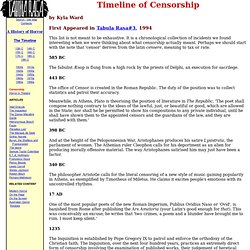
It is a chronological collection of incidents we found interesting when we were thinking about what censorship actually meant. Perhaps we should start with the note that 'censor' derives from the latin censere, meaning to tax or rate. CENSORSHIP - The Museum of Broadcast Communications. The Long History of Censorship. Mette NewthNorway, 2010 Censorship has followed the free expressions of men and women like a shadow throughout history.
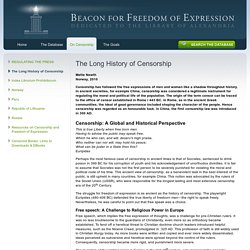
Psychedelic 60s: The Beats: New York. THE FLOWERING OF the Beat Generation in the late fifties was the result of a very slow germination process.
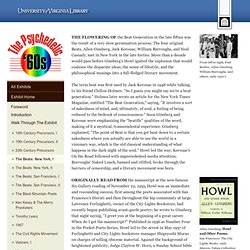
The four original Beats, Allen Ginsberg, Jack Kerouac, William Burroughs, and Neal Cassady, met in New York in the late forties. More than a decade would pass before Ginsberg's Howl ignited the explosion that would coalesce the disparate ideas, the sense of lifestyle, and the philosophical musings into a full-fledged literary movement. The term beat was first used by Jack Kerouac in 1948 while talking to his friend Clellon Holmes: "So I guess you might say we're a beat generation. " Censorship in the United States. In general, censorship in the United States, which involves the suppression of speech or other public communication, raises issues of freedom of speech, which is constitutionally protected by the First Amendment to the United States Constitution.
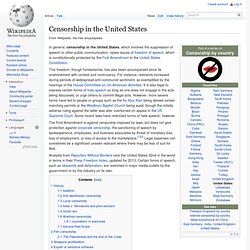
This freedom, though fundamental, has also been accompanied since its enshrinement with contest and controversy. For instance, restraints increased during periods of widespread anti-communist sentiment, as exemplified by the hearings of the House Committee on Un-American Activities. It is also legal to express certain forms of hate speech so long as one does not engage in the acts being discussed, or urge others to commit illegal acts. However, more severe forms have led to people or groups such as the Ku Klux Klan being denied certain marching permits or the Westboro Baptist Church being sued, though the initially adverse ruling against the latter was later overturned on appeal in the US Supreme Court.
History[edit] Sedition[edit] Near v. 1950s Teenagers. World War II had ended but the world felt far from safe, between the new war in Korea, frightening talk of the Communist menace, and the threat of nuclear war.
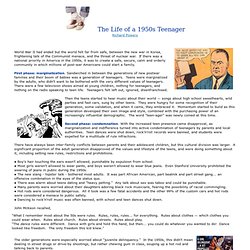
If there was a national priority in America in the 1950s, it was to create a safe, secure, calm and orderly community in which millions of post-war Americans could start a family. First phase: marginalization. Sandwiched in between the generations of new postwar families and their boom of babies was a generation of teenagers. Teens were marginalized by the adults, who didn't want to be bothered with the very different values of teenagers. There were a few television shows aimed at young children, nothing for teenagers, and nothing on the radio speaking to teen life. Then the teens started to hear music about their world — songs about high school sweethearts, wild parties and fast cars, sung by other teens. Second phase: condemnation. John McKeon recalled, "What I remember most about the 50s were rules. Book Censorship - U.S. Constitution - Amendment I - Censorship in the United States - US Legal System.
Censorship existed in the United States from its beginnings, the existence of the First Amendment notwithstanding.
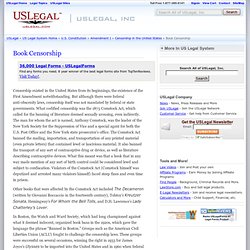
But although there were federal anti-obscenity laws, censorship itself was not mandated by federal or state governments. What codified censorship was the 1873 Comstock Act, which called for the banning of literature deemed sexually arousing, even indirectly. The man for whom the act is named, Anthony Comstock, was the leader of the New York Society for the Suppression of Vice and a special agent for both the U.S. Post Office and the New York state prosecutor’s office. The Comstock Act banned the mailing, importation, and transportation of any printed material (even private letters) that contained lewd or lascivious material.
Other books that were affected by the Comstock Act included The Decameron (written by Giovanni Boccaccio in the fourteenth century), Tolstoy’s Kreutzer Sonata, Hemingway’s For Whom the Bell Tolls, and D.H.
Burroughs. Ginsberg.